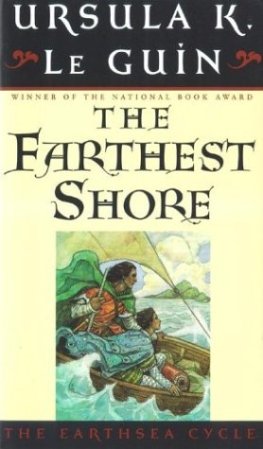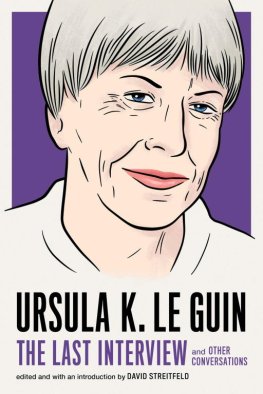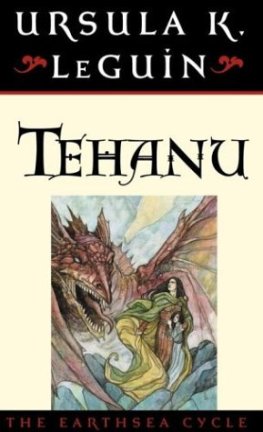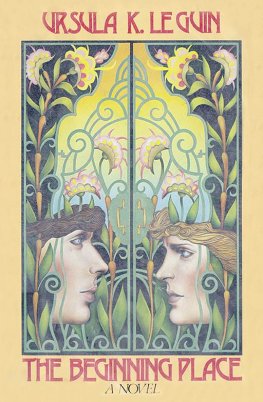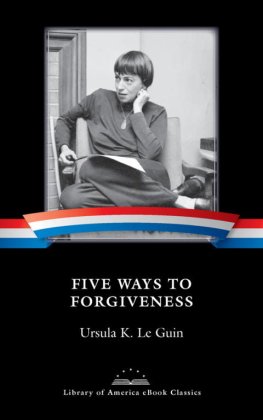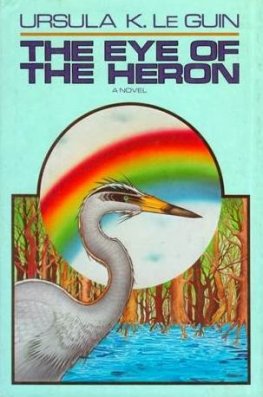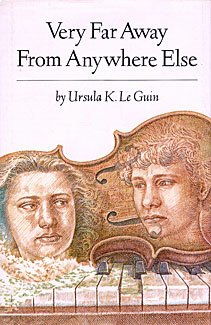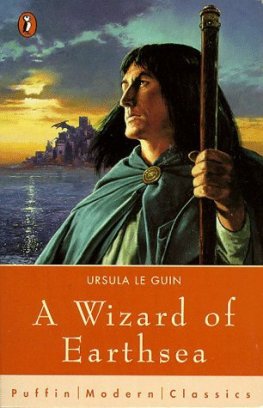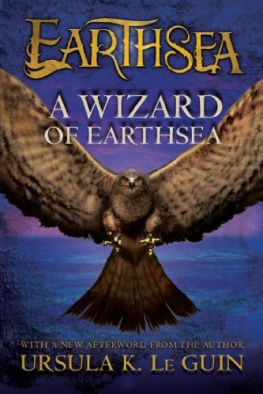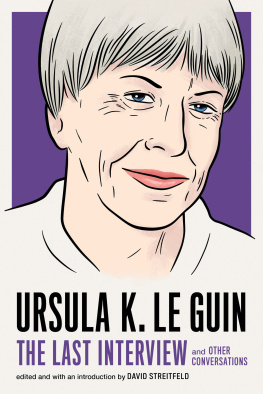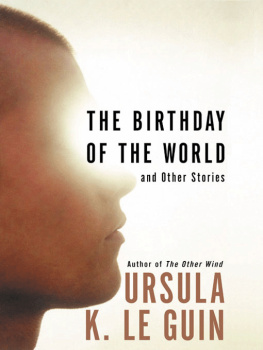Ursula Le Guin - Mountain Ways
Here you can read online Ursula Le Guin - Mountain Ways full text of the book (entire story) in english for free. Download pdf and epub, get meaning, cover and reviews about this ebook. genre: Science fiction. Description of the work, (preface) as well as reviews are available. Best literature library LitArk.com created for fans of good reading and offers a wide selection of genres:
Romance novel
Science fiction
Adventure
Detective
Science
History
Home and family
Prose
Art
Politics
Computer
Non-fiction
Religion
Business
Children
Humor
Choose a favorite category and find really read worthwhile books. Enjoy immersion in the world of imagination, feel the emotions of the characters or learn something new for yourself, make an fascinating discovery.

- Book:Mountain Ways
- Author:
- Genre:
- Rating:3 / 5
- Favourites:Add to favourites
- Your mark:
- 60
- 1
- 2
- 3
- 4
- 5
Mountain Ways: summary, description and annotation
We offer to read an annotation, description, summary or preface (depends on what the author of the book "Mountain Ways" wrote himself). If you haven't found the necessary information about the book — write in the comments, we will try to find it.
Mountain Ways — read online for free the complete book (whole text) full work
Below is the text of the book, divided by pages. System saving the place of the last page read, allows you to conveniently read the book "Mountain Ways" online for free, without having to search again every time where you left off. Put a bookmark, and you can go to the page where you finished reading at any time.
Font size:
Interval:
Bookmark:
Mountain Ways
Ursula K. Le Guin
Note for readers unfamiliar with the planet O:
KiO society is divided into two halves or moieties, called (for ancient religious reasons) the Morning and the Evening. You belong to your mothers moiety, and you cant have sex with anybody of your moiety.
Marriage on O is a foursome, the sedoretua man and a woman from the Morning moiety and a man and a woman from the Evening moiety. Youre expected to have sex with both your spouses of the other moiety, and not to have sex with your spouse of your own moiety. So each sedoretu has two expected heterosexual relationships, two expected homosexual relationships, and two forbidden heterosexual relationships.
The expected relationships within each sedoretu are:
The Morning woman and the Evening man (the Morning marriage)
The Evening woman and the Morning man (the Evening marriage)
The Morning woman and the Evening woman (the Day marriage)
The Morning man and the Evening man (the Night marriage)
The forbidden relationships are between the Morning woman and the Morning man, and between the Evening woman and the Evening man, and they arent called anything, except sacrilege.
Its just as complicated as it sounds, but arent most marriages?
In the stony uplands of the Deka Mountains the farmholds are few and far between. Farmers scrape a living out of that cold earth, planting on sheltered slopes facing south, combing the yama for fleece, carding and spinning and weaving the prime wool, selling pelts to the carpet-factories. The mountain yama, called ariu, are a small wiry breed; they run wild, without shelter, and are not fenced in, since they never cross the invisible, immemorial boundaries of the herd territory. Each farmhold is in fact a herd territory. The animals are the true farmholders. Tolerant and aloof, they allow the farmers to comb out their thick fleeces, to assist them in difficult births, and to skin them when they die. The farmers are dependent on the ariu; the ariu are not dependent on the farmers. The question of ownership is moot. At Danro Farmhold they dont say, We have nine hundred ariu, they say, The herd has nine hundred.
Danro is the farthest farm of Oro Village in the High Watershed of the Mane River on Oniasu on O. The people up there in the mountains are civilised but not very civilised. Like most kiO they pride themselves on doing things the way theyve always been done, but in fact they are a wilful, stubborn lot who change the rules to suit themselves and then say the people down there dont know the rules, dont honor the old ways, the true kiO ways, the mountain ways.
Some years ago, the First Sedoretu of Danro was broken by a landslide up on the Farren that killed the Morning woman and her husband. The widowed Evening couple, who had both married in from other farmholds, fell into a habit of mourning and grew old early, letting the daughter of the Morning manage the farm and all its business.
Her name was Shahes. At thirty, she was a straight-backed, strong, short woman with rough red cheeks, a mountaineers long stride, and a mountaineers deep lungs. She could walk down the road to the village center in deep snow with a sixty-pound pack of pelts on her back, sell the pelts, pay her taxes and visit a bit at the village hearth, and stride back up the steep zigzags to be home before nightfall, forty kilometers round trip and six hundred meters of altitude each way. If she or anyone else at Danro wanted to see a new face they had to go down the mountain to other farms or to the village center. There was nothing to bring anybody up the hard road to Danro. Shahes seldom hired help, and the family wasnt sociable. Their hospitality, like their road, had grown stony through lack of use.
But a travelling scholar from the lowlands who came up the Mane all the way to Oro was not daunted by another near-vertical stretch of ruts and rubble. Having visited the other farms, the scholar climbed on around the Farren from Keddin and up to Danro, and there made the honorable and traditional offer: to share worship at the house shrine, to lead conversation about the Discussions, to instruct the children of the farmhold in spiritual matters, for as long as the farmers wished to lodge and keep her.
This scholar was an Evening woman, over forty, tall and long-limbed, with cropped dark-brown hair as fine and curly as a yamas. She was quite fearless, expected nothing in the way of luxury or even comfort, and had no small talk at all. She was not one of the subtle and eloquent expounders of the great Centers. She was a farm woman who had gone to school. She read and talked about the Discussions in a plain way that suited her hearers, sang the Offerings and the praise songs to the oldest tunes, and gave brief, undemanding lessons to Danros one child, a ten-year-old Morning half-nephew. Otherwise she was as silent as her hosts, and as hard-working. They were up at dawn; she was up before dawn to sit in meditation. She studied her few books and wrote for an hour or two after that. The rest of the day she worked alongside the farm people at whatever job they gave her.
It was fleecing season, midsummer, and the people were all out every day, all over the vast mountain territory of the herd, following the scattered groups, combing the animals when they lay down to chew the cud.
The old ariu knew and liked the combing. They lay with their legs folded under them or stood still for it, leaning into the comb-strokes a little, sometimes making a small, shivering whisper-cough of enjoyment. The yearlings, whose fleece was the finest and brought the best price raw or woven, were ticklish and frisky; they sidled, bit, and bolted. Fleecing yearlings called for a profound and resolute patience. To this the young ariu would at last respond, growing quiet and even drowsing as the long, fine teeth of the comb bit in and stroked through, over and over again, in the rhythm of the combers soft monotonous tune, Hunna, hunna, na, na
The travelling scholar, whose religious name was Enno, showed such a knack for handling newborn ariu that Shahes took her out to try her hand at fleecing yearlings. Enno proved to be as good with them as with the infants, and soon she and Shahes, the best fine-fleecer of Oro, were working daily side by side. After her meditation and reading, Enno would come out and find Shahes on the great slopes where the yearlings still ran with their dams and the newborns. Together the two women could fill a forty-pound sack a day with the airy, silky, milk-colored clouds of combings. Often they would pick out a pair of twins, of which there had been an unusual number this mild year. If Shahes led out one twin the other would follow it, as yama twins will do all their lives; and so the women could work side by side in a silent, absorbed companionship. They talked only to the animals. Move your fool leg, Shahes would say to the yearling she was combing, as it gazed at her with its great, dark, dreaming eyes. Enno would murmur Hunna, hunna, hunna, na, or hum a fragment of an Offering, to soothe her beast when it shook its disdainful, elegant head and showed its teeth at her for tickling its belly. Then for half an hour nothing but the crisp whisper of the combs, the flutter of the unceasing wind over stones, the soft bleat of a calf, the faint rhythmical sound of the nearby beasts biting the thin, dry grass. Always one old female stood watch, the alert head poised on the long neck, the large eyes watching up and down the vast, tilted planes of the mountain from the river miles below to the hanging glaciers miles above. Far peaks of stone and snow stood distinct against the dark-blue, sun-filled sky, blurred off into cloud and blowing mists, then shone out again across the gulfs of air.
Enno took up the big clot of milky fleece she had combed, and Shahes held open the long, loose-woven, double-ended sack.
Font size:
Interval:
Bookmark:
Similar books «Mountain Ways»
Look at similar books to Mountain Ways. We have selected literature similar in name and meaning in the hope of providing readers with more options to find new, interesting, not yet read works.
Discussion, reviews of the book Mountain Ways and just readers' own opinions. Leave your comments, write what you think about the work, its meaning or the main characters. Specify what exactly you liked and what you didn't like, and why you think so.

